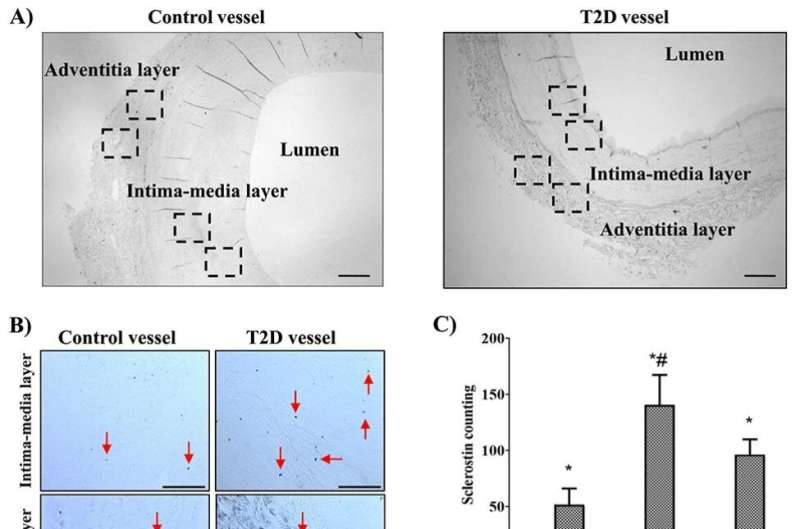This article has been reviewed according to Science X's editorial process and policies. Editors have highlighted the following attributes while ensuring the content's credibility:
fact-checked
trusted source
proofread
Sclerostin shown to be key protein for cardiovascular health in patients with type 2 diabetes

A study carried out by the MP20-Biomarkers of Metabolic and Bone Diseases research group at the Biohealth Research Institute in Granada (ibs.GRANADA), led by UGR Professor Manuel Muñoz Torres, has provided significant insights into the role of sclerostin in protecting against atherosclerosis in patients with type 2 diabetes.
The research is published in the journal Cardiovascular Diabetology.
Sclerostin, commonly associated with the regulation of bone formation, has emerged as a protective factor in vascular health, especially in individuals with type 2 diabetes. Atherosclerosis, a common complication of this disease, involves the deposition of substances such as cholesterol and fats in the arteries, resulting in the formation of plaques that can reduce blood flow and increase the risk of serious cardiovascular diseases.
The study, led by Professor Manuel Muñoz Torres, together with Dr. Beatriz García Fontana and Dr. Cristina García Fontana, included 121 controls and 139 patients with type 2 diabetes (48 with cardiovascular disease and 91 without).
The results showed significantly higher levels of sclerostin in patients with type 2 diabetes and cardiovascular disease, suggesting a possible link between this protein and atherosclerosis. Sclerostin was also shown to play a beneficial role in reducing arterial calcification, which is associated with the development of atherosclerosis.
The group of scientists from ibs.GRANADA, the "San Cecilio" University Hospital in Granada, the Center for Networked Biomedical Research on Frailty and Healthy Aging (CIBERFES) of the "Carlos III" Health Institute, as well as the UGR, carried out in vitro experiments on vascular smooth muscle cells, replicating pathophysiological conditions of patients with type 2 diabetes.
They found that sclerostin overexpression reduced calcium deposits, decreased cell proliferation and inflammation, and promoted cell survival.
The results, part of researcher Sheila González Salvatierra's doctoral thesis, raise concerns about the use of anti-sclerostin antibody treatments in patients with type 2 diabetes, as blocking sclerostin activity may increase cardiovascular risk. This discovery highlights the importance of following regulatory guidelines when prescribing these medications, which are contraindicated in people with high cardiovascular risk.
The authors of the study noted the clinical relevance of these findings, which have the potential to significantly impact therapeutic strategies for patients with type 2 diabetes and cardiovascular disease.
More information: Sheila González-Salvatierra et al, Cardioprotective function of sclerostin by reducing calcium deposition, proliferation, and apoptosis in human vascular smooth muscle cells, Cardiovascular Diabetology (2023). DOI: 10.1186/s12933-023-02043-8




















